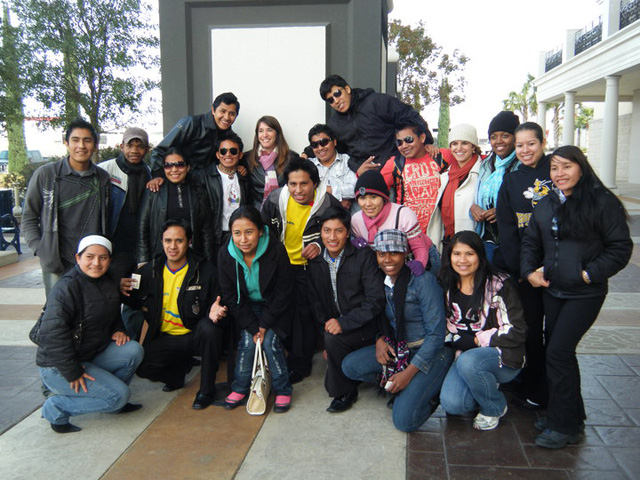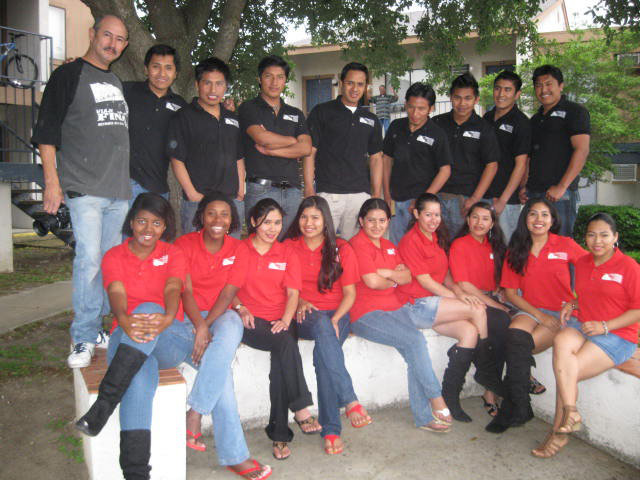
Students from Ecuador, Peru, Bolivia, and Columbia enjoyed watching "The Blind Side" at the Palladium with Anna Cohen Miller, their ESOL instructor. Photo courtesy IALS students.
In June, the Indigenous and Afro-Latino Scholarship recipients (IALS students) will bid a bittersweet farewell to San Antonio and Palo Alto College and return home to the countries and families they have not seen for two years.
This friendly, fun-loving group of 20 students from four South American countries, Bolivia, Colombia, Ecuador and Peru, started their experience at Palo Alto College in Fall 2008.
"They came to Palo Alto not knowing how to speak English at all," said Anna CohenMiller, Instructor of English as a Second Language. Now, one may sit down with this lively, cheerful bunch and easily hold a conversation in English.
The Indigenous and Afro-Latino Scholarship program is administered by Georgetown University's Center for Intercultural Education and Development (CIED). The IALS program is a highly competitive pilot program that provides full scholarships to outstanding youth from underrepresented communities in South America. Funding is provided by the InterAmerican Development Bank (IDB) for two years of postsecondary education at a fully accredited university and/or community college in the United States and Latin America.
"Our focus is to teach English as part of an initiative to promote higher education, as well as ethno-tourism/ecotourism to 'improve economic and social opportunities' and cross-cultural understanding," CohenMiller explained in the introduction to her essay Living Ecotourism- In Their Own Words. The essay is a compilation of six works by four students in the IALS program.
The IALS students learned to speak and write English in the Intensive English Program (IEP) offered at Palo Alto. IEP uses a Focal Skills approach to teach students English through four modules: Listening, Reading, Writing and Immersion.
"I remember the first day I came here without knowing any English. It was horrible because no one understood me. Communication was so difficult," said Fernando Criollo, an IALS student from Ecuador. "I remember the first day of my class, when my teachers spoke English and how my face was, because I thought it is going to be impossible."
Thanks to Palo Alto's IEP, and the moral support from each other, it was not impossible for Criollo and his fellow IALS to learn English. When asked the learning experience they valued most, the resounding answer was the English language.
"The most valuable thing I learned at Palo Alto is English. It is a beautiful language, also very difficult," said Nico Suarez, an IALS student from Peru. "I can understand, speak, and write a little, but I will keep practicing and will make a lot of effort to learn more and more."
English is a third language for a majority of the IALS students whose second language is Spanish. The first language of the IALS students varies, even between those coming from the same country but different communities.
The IALS students have visited many memorable tourist attractions in and around San Antonio, including the Institute of Texan Cultures, the NASA Space Center in Houston, and Six Flags Fiesta Texas.
Gabriel Guaman, a student from Ecuador, said he learned a lot from the places he visited. He plans on implementing what he learned to promote tourism in his own community.
The IALS students have been studying various subjects relating to ecotourism. They will take what they have learned while in San Antonio and improve the economic standards in their home communities.
"Through working with these students, I have gotten the opportunity to see them grow in confidence and maturity as well as deepen their understanding their home community," wrote CohenMiller.
The students are already planning how they will use what they learned while in the IALS program in their own communities.
"When I return to my country [I] will continue focusing on ecotourism and [at the] same time I want to work for my communities, advertising Indigenous Community Tourism," said Guaman. "I want to be the first person to start [this]."
The students are very excited to return home in June.
"I'm looking forward to going back home to swim and fish in the Amazon," said Eliceo Matapi, a student from Colombia. "The Amazon is one of the most wonderful places in the world that everyone really needs to visit."
Others, like Yined Ramos from Colombia, feel like they will be leaving their second family. The IALS students had most all of their classes together, lived in the same apartment complex and became very close during their stay.
Palo Alto College bids the IALS students a fond farewell and wishes everyone good luck in the future.
 Photo courtesy IALS students.
Photo courtesy IALS students.